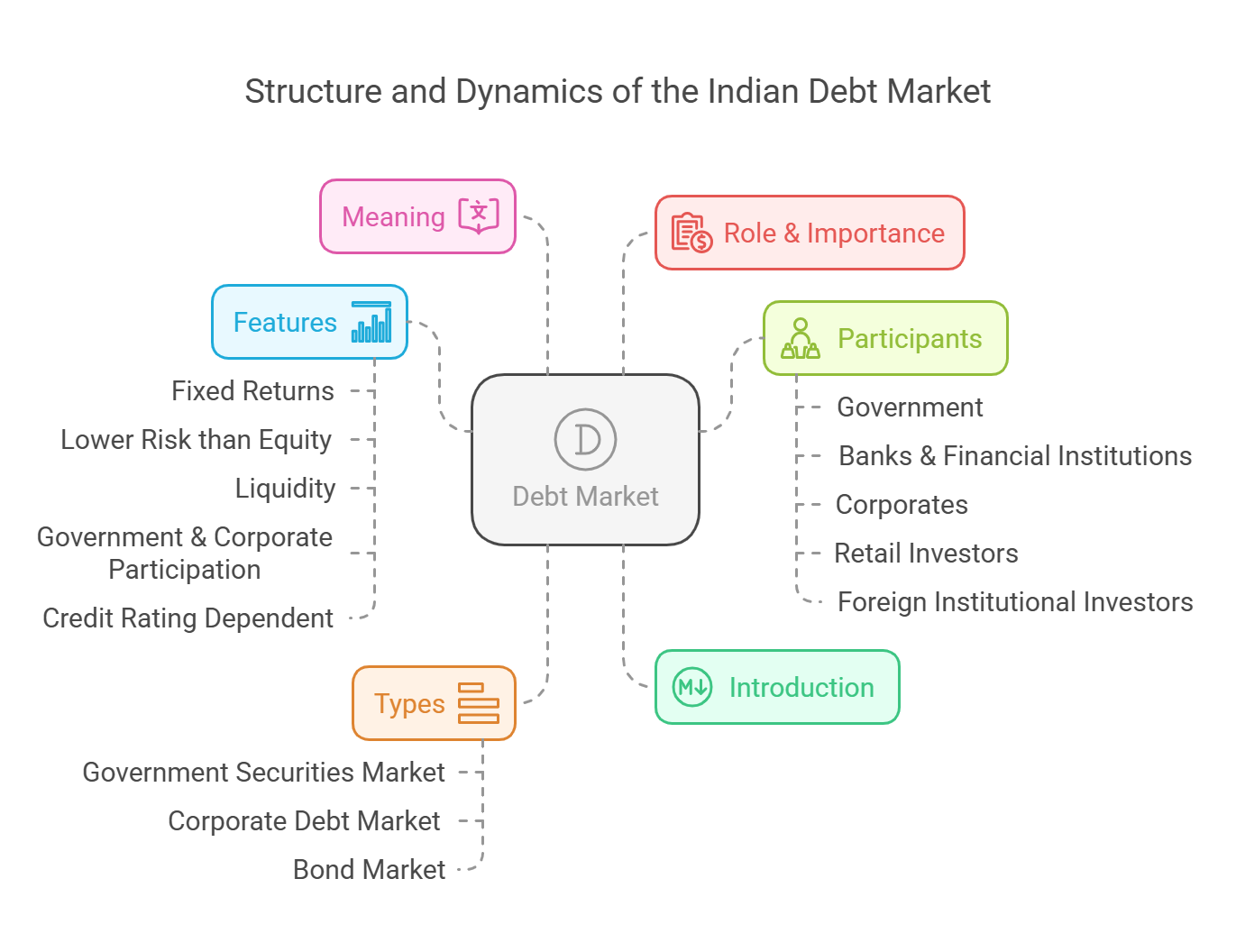Debt Market
1. Introduction to the Debt Market
The Debt Market is a financial marketplace where debt securities, also known as fixed-income instruments, are bought and sold. These instruments represent a loan made by an investor to a borrower (typically a government, corporation, or financial institution). In exchange for the loan, the borrower promises to pay back the principal amount along with periodic interest payments (coupon payments) over a specified period.
The Indian Debt Market is one of the largest in Asia, comprising a wide range of government and corporate debt instruments that cater to diverse investor needs and risk preferences.
2. Meaning of Debt Market
A Debt Market is a segment of the financial market where investors lend money to borrowers (governments or corporate entities) in exchange for the promise of fixed interest payments over a specified period. Unlike the equity market, where investors purchase ownership stakes in companies, the debt market involves borrowing and lending arrangements. The debt market is also known as the Fixed Income Market, because most of the debt instrument promises the investor a fixed sum of money to be paid over a period of time.
3. Features of the Debt Market
The debt market is characterized by several key features:
- Fixed Returns: Investors typically earn regular interest payments (coupon payments) over the life of the debt instrument, providing a predictable income stream.
- Lower Risk than Equity: Debt instruments are generally considered safer than stocks (equity shares) because they have a higher claim on the issuer's assets in the event of bankruptcy.
- Liquidity: Debt instruments are actively traded in both primary and secondary markets, offering investors opportunities to buy and sell their holdings.
- Government & Corporate Participation: Both governments and corporations issue debt securities to raise capital for various purposes.
- Credit Rating Dependent: The creditworthiness of corporate debt instruments is assessed by credit rating agencies such as CRISIL, ICRA, and CARE. These ratings provide investors with an indication of the issuer's ability to repay its debt obligations.
4. Types of Debt Markets in India
The Indian Debt Market is broadly divided into three main categories:
A. Government Securities (G-Secs) Market:
- Issuer: Central and State Governments.
- Examples: Treasury Bills (T-Bills), Government Bonds, State Development Loans (SDLs).
- Risk Profile: Considered virtually risk-free due to the backing of the government.
- Regulation: Regulated by the Reserve Bank of India (RBI), which manages the issuance and trading of G-Secs.
B. Corporate Debt Market:
- Issuer: Companies and Financial Institutions.
- Examples: Corporate Bonds, Debentures, Commercial Papers (CPs).
- Yield: Typically offers higher yields compared to G-Secs to compensate investors for the increased credit risk.
- Regulation: Regulated by the Securities and Exchange Board of India (SEBI), which sets rules for the issuance and trading of corporate debt.
C. Bond Market:
- Scope: This market encompasses both Government and Corporate Bonds, providing a platform for trading fixed-income securities.
- Trading Venues: Bonds are actively traded in secondary markets, such as the Bombay Stock Exchange (BSE) and National Stock Exchange (NSE).
5. Role & Importance of the Debt Market
The Debt Market plays a crucial role in the Indian financial system and the overall economy:
- Capital Mobilization: Helps governments and corporations raise funds for infrastructure projects, business expansion, and other essential activities.
- Stability in Financial Markets: Provides a more stable and predictable investment option compared to the equity market, reducing overall market volatility.
- Investment Diversification: Offers investors an alternative to stocks and real estate, allowing them to diversify their portfolios and manage risk effectively.
- Monetary Policy Implementation: The RBI uses debt instruments, such as Government Bonds, to implement monetary policy, control liquidity, and manage inflation.
6. Participants in the Debt Market
The Debt Market involves a diverse range of participants:
- Government (Central & State): Issues bonds to finance budget deficits, infrastructure development, and other public projects.
- Banks & Financial Institutions: Invest in bonds to meet their statutory liquidity requirements, manage their asset-liability positions, and earn fixed returns.
- Corporates: Issue debentures and bonds to raise capital for business expansion, acquisitions, and refinancing.
- Retail Investors: Invest in debt instruments through mutual funds, Exchange Traded Funds (ETFs), and direct purchases to generate regular income and diversify their portfolios.
- Foreign Institutional Investors (FIIs): Invest in Indian bonds under RBI regulations, contributing to the inflow of foreign capital into the country.
Conclusion:
The Debt Market is a vital component of India's financial system, providing a stable investment avenue and a crucial source of funding for governments and corporations. It is an essential element of a well-functioning economy, offering liquidity, diversification, and lower-risk investment options for a wide range of participants.


No Comments